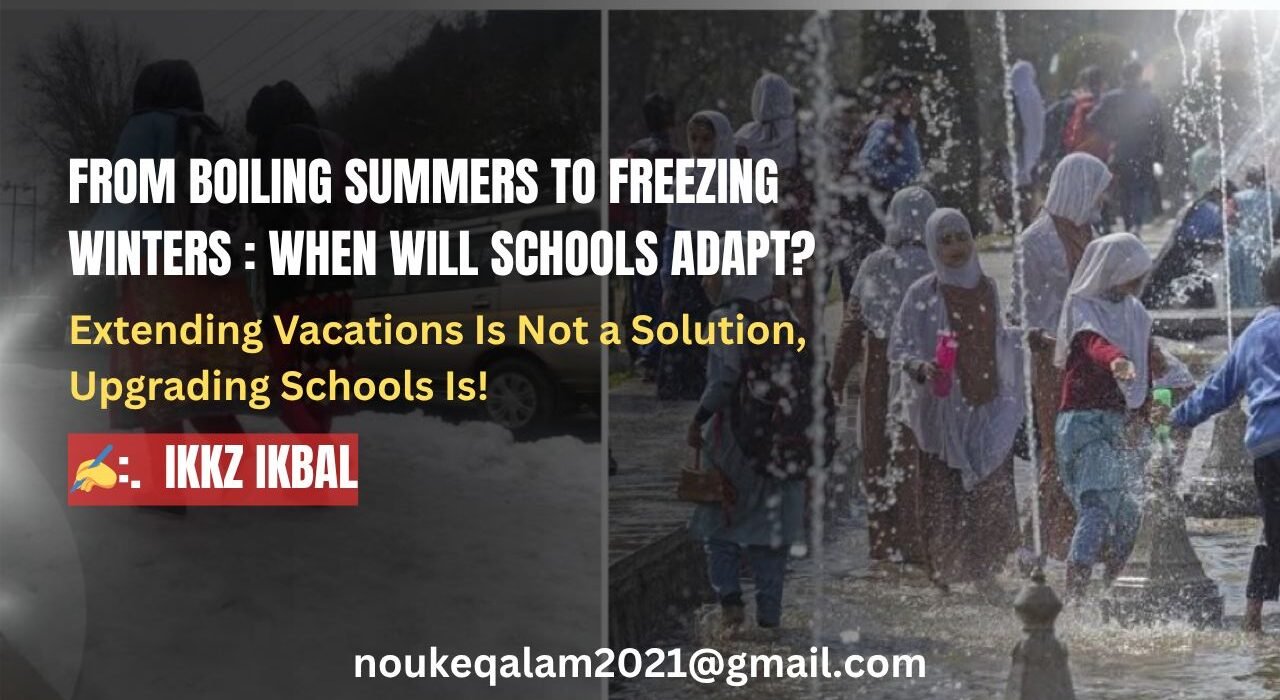This year, summer in Kashmir is burning with sweltering heat, nothing short of relentless. Temperatures are soaring at an all time high in over a century and the valley finds itself gasping under a suffocating sun. It feels extremely uncomfortable for children to return to school in this scorching heat. The classrooms turn into furnaces and school buses become mobile ovens. Should the Government extend the summer break to protect students from this unbearable heat, or should we finally confront the deeper issue—our chronic unpreparedness for extreme weather in the education sector?
The heat this year isn’t just uncomfortable. It’s brutal. And most of our schools are not equipped to handle such extreme weather conditions. The reality is stark: our classrooms lack basic cooling appliances like air conditioning, some schools have barely functional fans, poor ventilation and tin roofs that trap heat. The school buses are also nothing short of heat chambers. In such a scenario, expecting children to learn is not only impractical—it’s unfair.
Let’s be honest, we weren’t prepared for last winter either. And now we are similarly unprepared for the heat of this summer. Every year, the same cycle gets repeated, first, schools are closed in the winter owing to cold temperatures and snow, and then again in the summer due to scorching heat. It’s a cruel irony that our children spend more time away from school than in it. However, the issue remains: How long will we rely on nature’s benevolence to determine our academic calendar?
While authorities may consider holiday extensions as a temporary solution, it is essential to recognise that this is no longer a temporary weather issue—it is a climate crisis exacerbated by decades of poor educational infrastructure design. Every time we lengthen school vacations, we deprive students, particularly in government institutions, of valuable learning time. We already have a rigorous academic calendar. With disruptions from political upheaval, pandemics, and now climate, the window for meaningful classroom engagement is shrinking fast.
Extending vacations is merely a stopgap, not a strategy. The more we normalise this, the more we reinforce a harmful mindset: learning is seasonal and adaptability is elective. More than empathy, the problem necessitates immediate action as well as long-term preparation. All classrooms and school buses must have air conditioning or powerful fans installed.
Cold and safe drinking water should be available in every classroom and transportation. Morning school hours should be implemented throughout the peak summer months as a better option to vacation extension. Before winter returns, verify that proper insulation and heating are in place. Green infrastructure—trees, ventilated architecture, and shaded playgrounds—should become standard in school design. Private schools, too, must be subjected to regulatory oversight to ensure compliance and child safety in adverse weather.
Parents’ Associations from various districts should come together to make urgent submissions to the Directorate of School Education, Kashmir (DSEK). The plea must not just request temporary respite, but also a long-term climate adaptation plan for all educational institutions, both public and private. This summer isn’t an isolated incident. Climate change is no longer a prediction; it is a daily reality. If we continue to perceive these weather extremes as temporary obstacles rather than structural warnings, we are failing our children.
Education, in its essence, is a preparation for life. But how can we prepare young brains for life if our schools are not ready to accommodate them? The government, the education department, school administrators, and society at large must reflect. Why do we still have schools without fans, roofs, or water? Why are our students usually the last priority? Let us cease treating the calendar as a bandage. Let us utilise our conscience, policy, and voice to create institutions that are not simply places of learning, but also havens of safety and care—come heat or cold. Because rising temperatures aren’t the only issue; standards are also decreasing.
The author is a Columnist, Educationist, and founder of Rizq Revolution. He has a PG in Biotechnology and is Principal at Maryam Memorial Institute Pandithpora Qaziabad. He X’s @IkkzIkbal







Регистрирайте се, за да получите 100 USDT
July 6, 2025Your point of view caught my eye and was very interesting. Thanks. I have a question for you. https://accounts.binance.info/es-MX/register?ref=GJY4VW8W